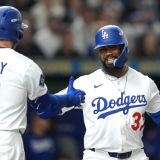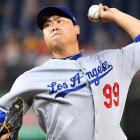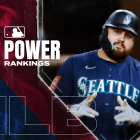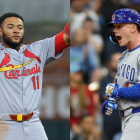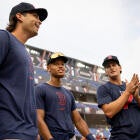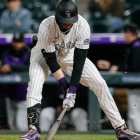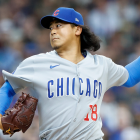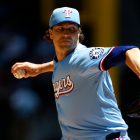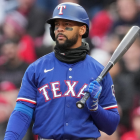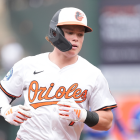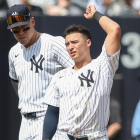Last year's National League pennant winners vs. the hottest team in all of baseball. Traditional power vs. expansion-era franchise that has never won a World Series. The 2018 NLCS delivers all kinds of fascinating storylines, and that's before we get to the actual players involved. Let's break it all down:
Lineups
Dodgers offense: 118 wRC+* (1st in NL)
Brewers offense: 104 wRC+ (5th in NL)
Dodgers defense: 47 Defensive Runs Saved (5th in NL)
Brewers defense: 116 Runs Saved (2nd in NL)
*wRC+ refers to Runs Created Plus, a stat that compares each team's offense to league average, with average being 100. (A score of 118 would thus be 18 percent better than league average, and 104 would be 4 percent better.) We've stripped out pitcher hitting for this version of wRC+, since managers Dave Roberts and Craig Counsell are likely to have quicker hooks than usual, meaning we might rarely see a team's pitchers bat more than once in a game.
With the Dodgers being this dominant as a team offensively, you would expect to find multiple superstar hitters on the roster. Instead, what you get is a stupendously balanced lineup. That's how you find seven hitters with 20 or more home runs this year, led by out-of-nowhere slugger Max Muncy's team-best 35 homers and a robust 162 wRC+ that ranked behind only MVP front-runner Christian Yelich among NL hitters with as many plate appearances.
More than that, this is a team that gets the most out of its talented but flawed players, by aggressively deploying platoons. For instance, Joc Pederson slugged an impressive .522 and tied for second on the team with 25 homers, but he only garnered 53 at-bats against left-handed pitchers this year, both because he's awful against them (.170/.211/.302 in that small sample this year, plus ugly career results) and also because the Dodgers deploy an army of powerful right-handed hitters to split time with their lefty-swingers, with Chris Taylor and Matt Kemp filling that role in the outfield.
Milwaukee's calling card (or at least one of them) is its defense. Lorenzo Cain remains a Gold Glove-caliber vacuum cleaner in center field even into his 30s, while Yelich complemented his powerful bat with a steady glove himself, forming an airtight outfield alignment that gobbled up potential doubles and triples all year long. The Brewers also parlayed shifts into outs more successfully than any team except the Diamondbacks. As we'll see, that terrific defense turned a no-name rotation into a capable group of starters, and turned a very good bullpen into an all-world bullpen.
The Brewers recognized the dominance of that defense, and did something truly fascinating about it: They willingly sacrificed some of it to upgrade their offense. That didn't mean doing something rash like trading away Cain. Instead, the Crew acquired power-hitting infielders Mike Moustakas and Jonathan Schoop at the deadline. Schoop has been a bust since coming over at the deadline from Baltimore, and now rides the pine. But Moustakas added left-handed pop as the team's new third baseman down the stretch, then raked during the NLCS against the Rockies. What's more, Milwaukee's brass moved erstwhile third baseman Travis Shaw to first base, playing one of their best players out of position and weakening the team's defense for the sake of making their starting eight scarier for opposing pitchers. As a result, this is now a more balanced ballclub in its own right, one led by a breakout superstar in Yelich and a terrific core of hitters one-through-six in the order.
Pitchers
Dodgers rotation: 83 ERA-* (1st in NL), 85 FIP-** (1st in NL), 25.7 percent K rate (1st in NL)
Brewers rotation: 96 ERA- (8th in NL), 105 FIP- (11th in NL), 20.3 percent (10th in NL)
Dodgers bullpen: 97 ERA-* (5th in NL), 97 FIP-** (8th in NL), 25.7 percent K rate (3rd in NL)
Brewers bullpen: 85 ERA- (2nd in NL), 86 FIP- (2nd in NL), 27.6 percent (1st in NL)
*ERA- refers to park-adjusted ERA. A score of 100 is league average, meaning a score of 83 is 17 percent better than league average, and 96 is 4 percent better than league average.
**FIP- refers to park-adjusted fielding-independent pitching. This stat focuses on the factors a pitcher can best control, such as strikeout rate, walk rate, and home-run rate, and strips out the effects of defense and luck. It runs along the same scale as ERA-.
Dodgers starters led the National League in most significant statistical categories. Yet for all that success, question marks abounded as L.A. rolled into the postseason.
First, how would Clayton Kershaw perform in the playoffs, given that the three-time Cy Young winner had laid plenty of eggs in past Octobers? Answer: Pretty damn well, with Kershaw tossing eight shutout innings at the Braves in the NLDS. Rich Hill didn't fare nearly as well in his first postseason start this year, walking five batters and failing to make it through the fifth inning; he's one of the most injury-prone starters in the game, and is far from a lock to pitch deep into games for the Dodgers. Right-hander Walker Buehler pitched well beyond his years in his debut season and might've won Rookie of the Year in a season that didn't see Ronald Acuna Jr. and Juan Soto smash opposing pitchers. His start against the Braves is tough to dissect, since Buehler struck out five batters and allowed just two hits in five innings, with four of those being scoreless frames ... but the Braves tallied five runs in the one inning in which they did score against him.
The x-factor for this rotation, then, could be oft-injured but talented veteran left-hander Hyun-Jin Ryu. For more on Ryu, let's turn to Nick Pollack, our pitching analyst and running mate throughout this season, and proprietor of the excellent website Pitcher List.
It hasn't been an easy road for Hyun-Jin Ryu. Few pitchers have been hit harder by injuries over the past three seasons, as the southpaw tallied just one start in 2016, only 126 ⅔ innings in 2017, and a small sample of 15 starts due to a groin injury in 2018. Ryu's missed time hasn't stopped him from improving, however. This year saw Ryu work 82 ⅓ innings with a magnificent 1.97 ERA, providing surprising consistency for a Dodgers club that dealt with Clayton Kershaw's back issues and back-and-forth roles for other starters.
Ryu has thrived by changing eye levels between his fastball and secondary pitches. Notice the separation between his fastball and curveball in the following GIF:
Hyun-jin Ryu, 90mph high Fastball and 74mph Curveball, Overlay/Slow. pic.twitter.com/YvkK0ZJss7
— Rob Friedman (@PitchingNinja) October 5, 2018
In fact, Ryu has elevated his fastball a lot more often in 2018, feeding a jump in swinging-strike rate from a mediocre 7.5 percent to an excellent 12.1 percent clip:

Meanwhile, Ryu hasn't just been locating his curveball down low. His changeup has seen the same growth, locating consistently down in the zone to pair perfectly with his fastball. It works beautifully when executed well, something he's done often this season:
The changeup's whiff rate has jumped from an already impressive 18.7 percent rate to 23.0 percent this season, holding batters to just a .177 batting average and two extra-base hits in 230 thrown.
Kershaw and Ryu thus fuel a big edge when it comes to starting rotations, given what the Brewers plan to throw out in this series: walks machine Gio Gonzalez; rejuvenated but still weak-pedigreed lefty Wade Miley; right-hander Jhoulys Chacin, whose fielding-independent numbers languished above 4.00; and a fourth starter to be named who might or might not be '80s mustache king Pete Vuckovich. The Brewers' defense has helped that middling group put up better-than-expected results, with fly-ball pitchers in particular benefiting from that stellar outfield.
Still, the Brewers' trump card in this series is its bullpen. Right-hander Jeremy Jeffress flourished as he shifted into the team's closer role this season. Previous ninth-inning man Corey Knebel went from 2017 All-Star to getting sent to the minors this summer ... only to rebound with video-game numbers once he returned in late August: 30 strikeouts and a 0.00 ERA over his final 14 regular-season innings.
But the star of this pen, and the Brewers' best chance to steal a game or three in this series in the late innings, is long-haired lefty slinger Josh Hader. For more on Hader, let's bring back our pal Nick Pollack of Pitcher List.
Like many relievers, Josh Hader was once seen by his bosses as a potential starter. But by moving him to relief work full time, the Brewers discovered that Hader's fastball could be a nuclear weapon in shorter outings, and that they had the National League's version of Andrew Miller on their hands.
Reducing his repertoire to two pitches has enabled Hader to take chances. His aggressive mechanics may not work consistently over an entire start, but they completely overwhelm opponents in shorter bursts.
For proof, we submit this home-plate view of Josh Hader's fastball against Cubs slugger Anthony Rizzo:
Josh Hader, Shoving a 98mph Fastball (home plate view). 🔥 pic.twitter.com/4OvtIjwbLW
— Rob Friedman (@PitchingNinja) September 13, 2018
Hader is stepping toward first base with each pitch, twisting and contorting his body toward second before unleashing a heater in the upper-90s. Rizzo barely gets a moment to see the ball out of Hader's hand. When he does, it's in an awkward location, starting well behind Rizzo's body before whipping across the batter's box and back over the plate.
That crossfire delivery and funhouse mirror movement can be disarming and terrifying to face. It's led to incredible results. Hader posted the second lowest opponents' batting average of all pitchers in the majors, with a sublime .131 mark. His 48.3 percent strikeout rate tops all pitchers ... and bears reiterating. He struck out nearly half of the batters he faced(!!!).
Hader's unhittable fastball and impressive stamina (he struck out eight batters in 2 2/3 magical, scoreless innings against the Reds on April 30) mean that Milwaukee is a major threat to win every game this series that's tied or nearly tied heading into the eighth (or even seventh) inning.
Prediction
So we're calling it now: Josh Hader wins NLCS MVP and the Brewers knock out the Dodgers in 6, returning to the World Series for the first time in 36 years.
![[object Object] Logo](https://sportshub.cbsistatic.com/i/2020/04/22/e9ceb731-8b3f-4c60-98fe-090ab66a2997/screen-shot-2020-04-22-at-11-04-56-am.png)



